Wow! Those guys at the Maine Institution really know their onions. I love how they broke down practically what and how school age children should be fed. Affordable child nutrition is their goal they made it possible.
I also noticed that sponsors (parents) where reimbursed almost 95% of what they paid for the meals, this is such an encouragement. You’ll pay first, get the nutritious food for the children, they eat it and the sponsor is paid back. That’s such an incentive.
It’s things like this that makes the US to be called a ‘developed nation’ right? Nigeria will get there but at least we the parents at home will start.
That’s a response from one of the Moms in our Nourish Flourish Moms Club to a resource I had shared on how the Government in Maine (United States) is so vested in how the schools in their district not only educate their students about Nutrition, but also in what the school feeding program looks like. It was so detailed and just WOWed us all. I am not sure when this will be the case in Nigeria, but until then, like this Mom said, we must start at HOME first.

This is why we are doing this Lunch Box Purity series. The buck rests on our tables and the health of our kids are in our hands. The goal is UNCOUNTABLE junk-free lunch boxes, and then ultimately KITCHENS and DINING TABLES of AFFECTION like I said on TVC on Val’s day

This week, the train takes us to Shenyang, Chinaaaaaaa, and we have the sweet and lovely Koko Chen. My friend and Sister Ugonne, who lives in China did the connection .as I really wanted this LBP to have a global feel. Koko gave me no issues at all I recall getting her first email and being shocked at the Sender language because it was new to me, then it dawned on me that her name had to show in Chinese.
Despite English not being her first language, she did such a phenomenal job. Let me allow you dive into it and enjoy…
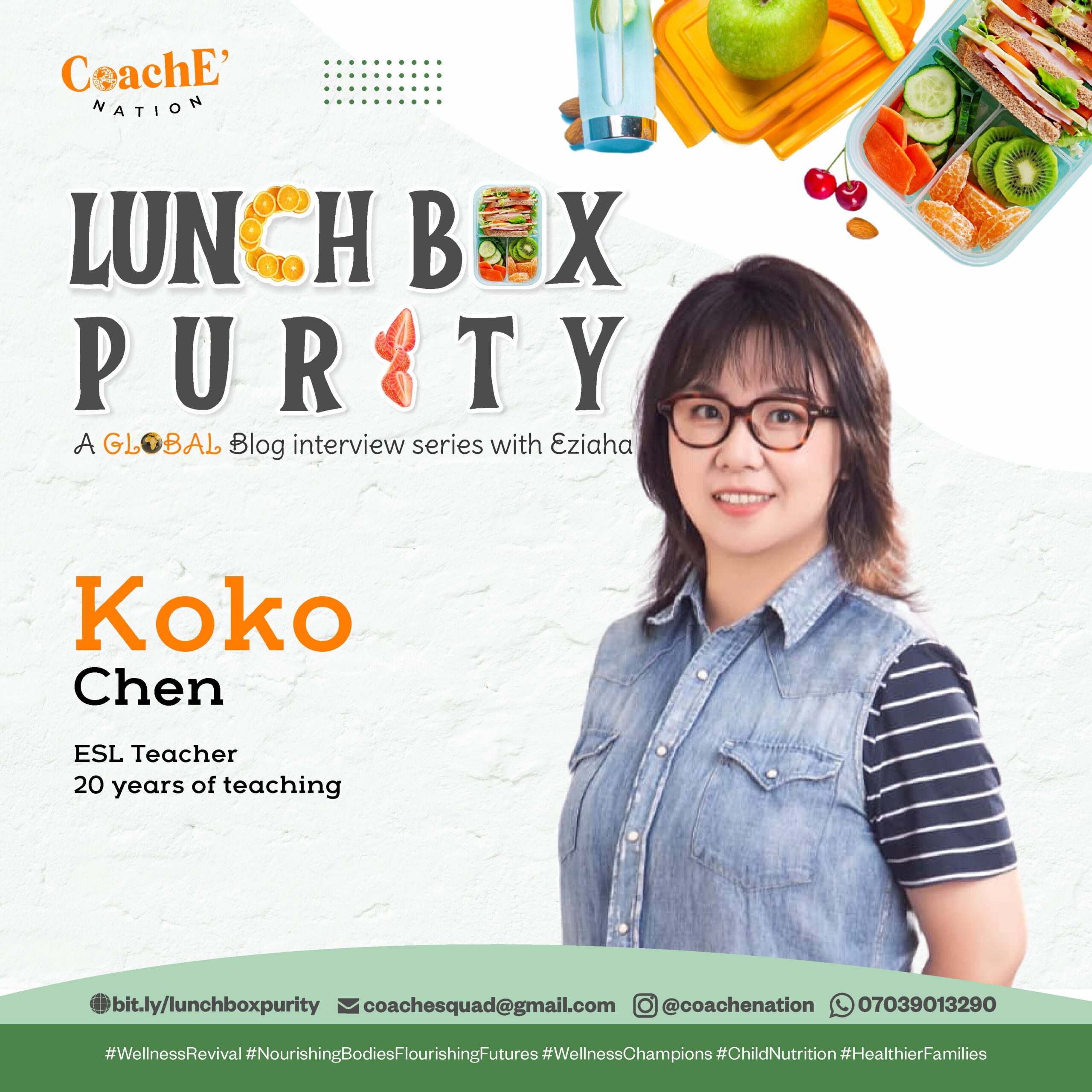
1. Please tell us your name, where you currently teach , years on the job and how you got into the beautiful world of education
Hi, there. My name is Chen Kexin. But I usually go by Koko. I am from Shenyang, China. I began to work since 2002 when I graduated from my university. I have been working in different positions in education field, an ESL teacher for young learners, teenagers and adults, a team leader of foreign teachers in an international kindergarten and a project manager for an IELTS training school in Beijing. Right now, I am an independent ESL teacher working for myself and I give online English lessons for students aged from 3 to 12. Do you know why I am into teaching? Well, it’s easy to answer. Because my mom was a teacher. She taughtphysics in high school and she was a wonderful teacher who influenced me a lot in my career.
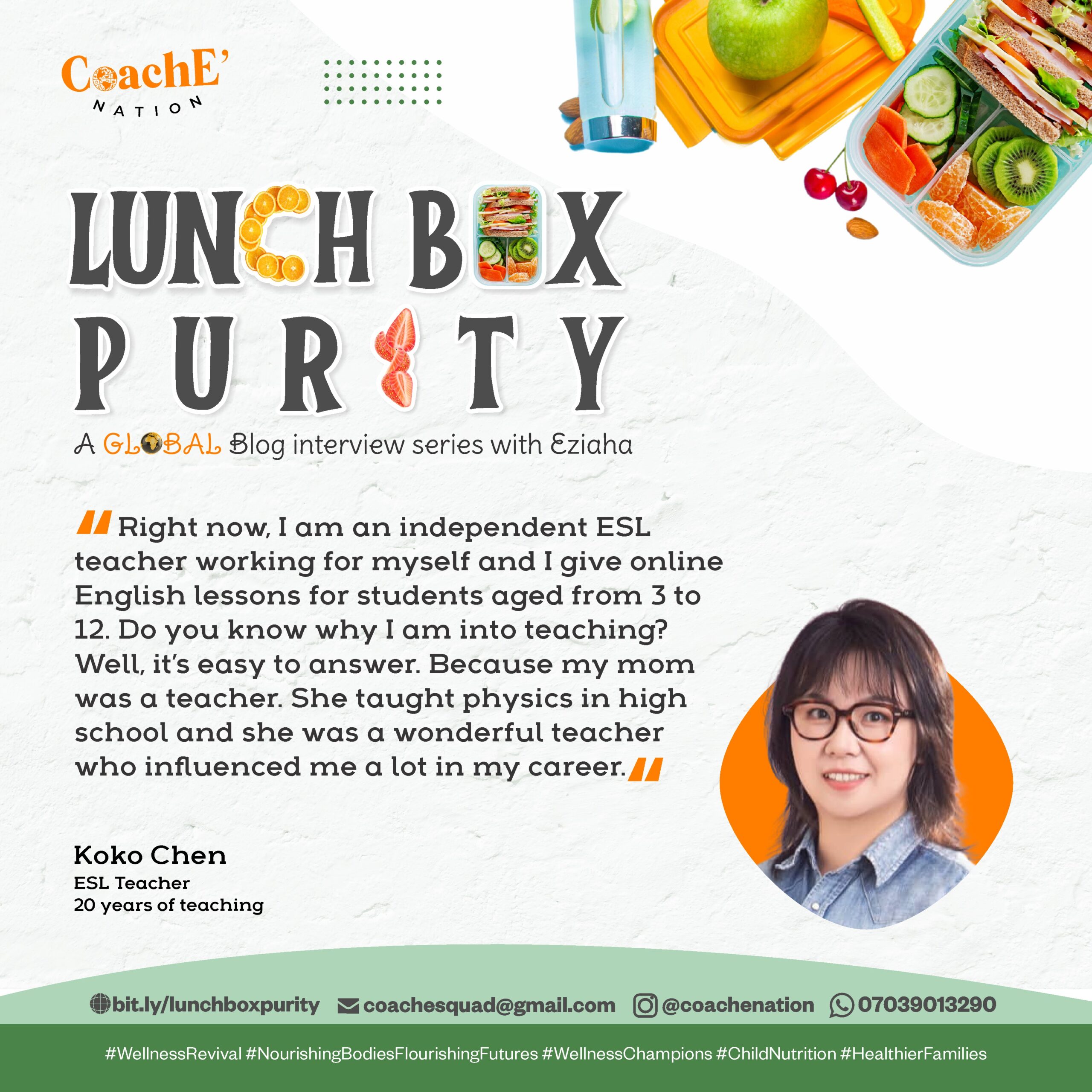
(Shout out to Influencer Moms!!! Such a goal for me. I want to be my Kids’ number one Influencer!)
2. What is your most significant/memorable experience as an Educator?
When I was working as an English teacher and a college counselor, one of my students was fired in his internship in the airport because of his off-duty actions. His mother phoned me and complained about the innocence of her son, how it was all the other person’s fault and her son was unfairly treated. It took me nearly one hour to explain the whole thing and turned the mother’s thought into how lucky his son was to learn a lesson from this issue instead of thinking he was singled out for punishment. Ever since then I realized that truly “Like a father, like a son.” A good teacher should not only teach children knowledge, but also tutor their parents in how to educate their kids.
(This is so so powerful and I was telling the Head of School at my kiddo’s school recently that they needed to quickly start to, in a structured manner, educate us too on some educational best practices because Educators really really know a lot and they almost take it for granted. So basically Koko educated the parent and I love how this is such a significant experience for her)
3. Is it actually possible for a school to eliminate completely junk in the lunch box of our children as opposed to having a few days a week where junk is not allowed? If no, why?
It would be great for a school to eliminate completely junk in the lunch box of our children as opposed to having a few days a week where junk is not allowed. But we all know that is not easy. As a parent when our six-month old babies begin to eat semi-solids and solids, we start little by little; more food and less milk, until food only without baby milk again which takes more than a year. Schools can take the same approach to progressively eliminate junk in the lunchbox.

(I love this analogy with babies. Like Mrs Tagbo said in the last episode, for start-up schools, it’s a lot easier to start junk-free, but in cases of elimination, we must go progressively.)
4. Have you ever been a part of a transitioning process in the school? By this, I mean where the school decides that we would have junk-free days a few times a week, or even junk-free days everyday. If yes, how was that transition process and what was the outcome like?
What impact did you see in the children? And if you were to help another school transition, what are the best practices you would recommend to make it seamless?
I have been a part of transitioning process in schools. At first everyone is not feeling very good about it because the routine was broken. As it goes on, people get used to it sooner or later. The problem is how we can help them finish the process quickly and with as little friction as possible. If I were to help another school transition, I would probably preheat the issue in many ways (that is start to sensitize them ahead before implementation) and give everyone a longer time to accept this new junk-free culture. I would not be too shocked or disappointed it things go backward at some point because that is natural and expected with any lifestyle change, but I would persist and insist on it working. Finally we would make a
success of it, I am sure.
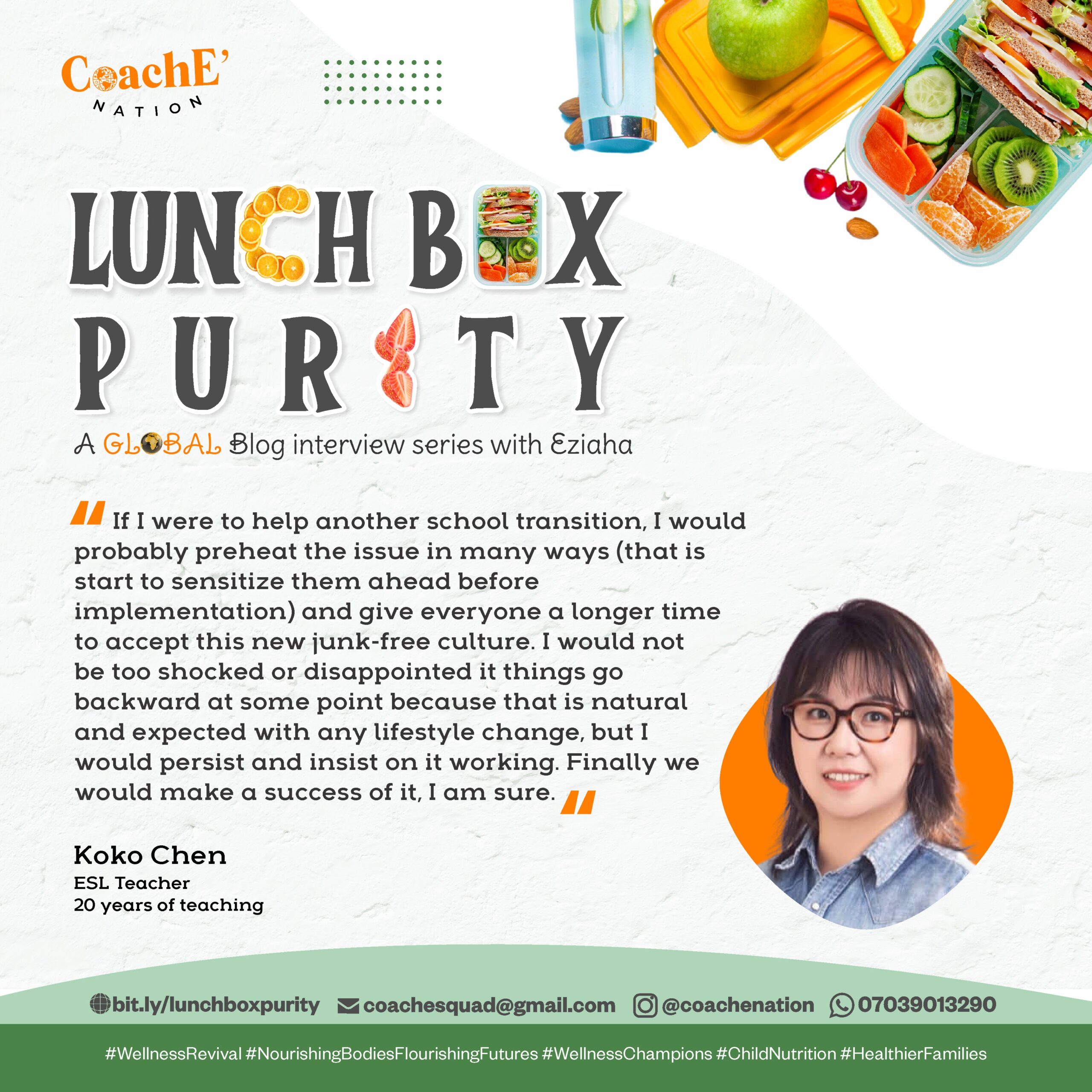
(Look at Koko confirming what everyone should KNOW by now: change takes time and won’t always be straightforward but with persistence, change will happen)
5. Are there times when you have had to intervene per the content of a child’s lunch box, especially when you can see that the frequency and volume can negatively impact on the child’s health both short term and especially long term? What role can parents play in supporting your efforts to promote healthy eating? How best should we communicate with parents about the importance of nutritious lunches? Do you have any practical success stories on this?
I would make the interval time between when the kids consume the junk in the boxes longer and then introduce weekly junk-free challenges, such as JUNK-FREE STAR of the week. For example, if a kid has a junk-free lunch box today, he or she would win a star. When they collect 5 or 10 stars, they would win a trophy and become the JUNK-FREE STAR with some kid-friendly benefits to follow. Fun activities like this will help to encourage eating healthy food and if this is successful, it will be the kids’ duty to ask parents for junk-free lunchboxes daily. When parents see and hear how happy and proud kids are when they win the trophies for junk-free lunchboxes, they would do something to make this a culture at home. Ideally, parents should be the example but in some cases, even they need help!
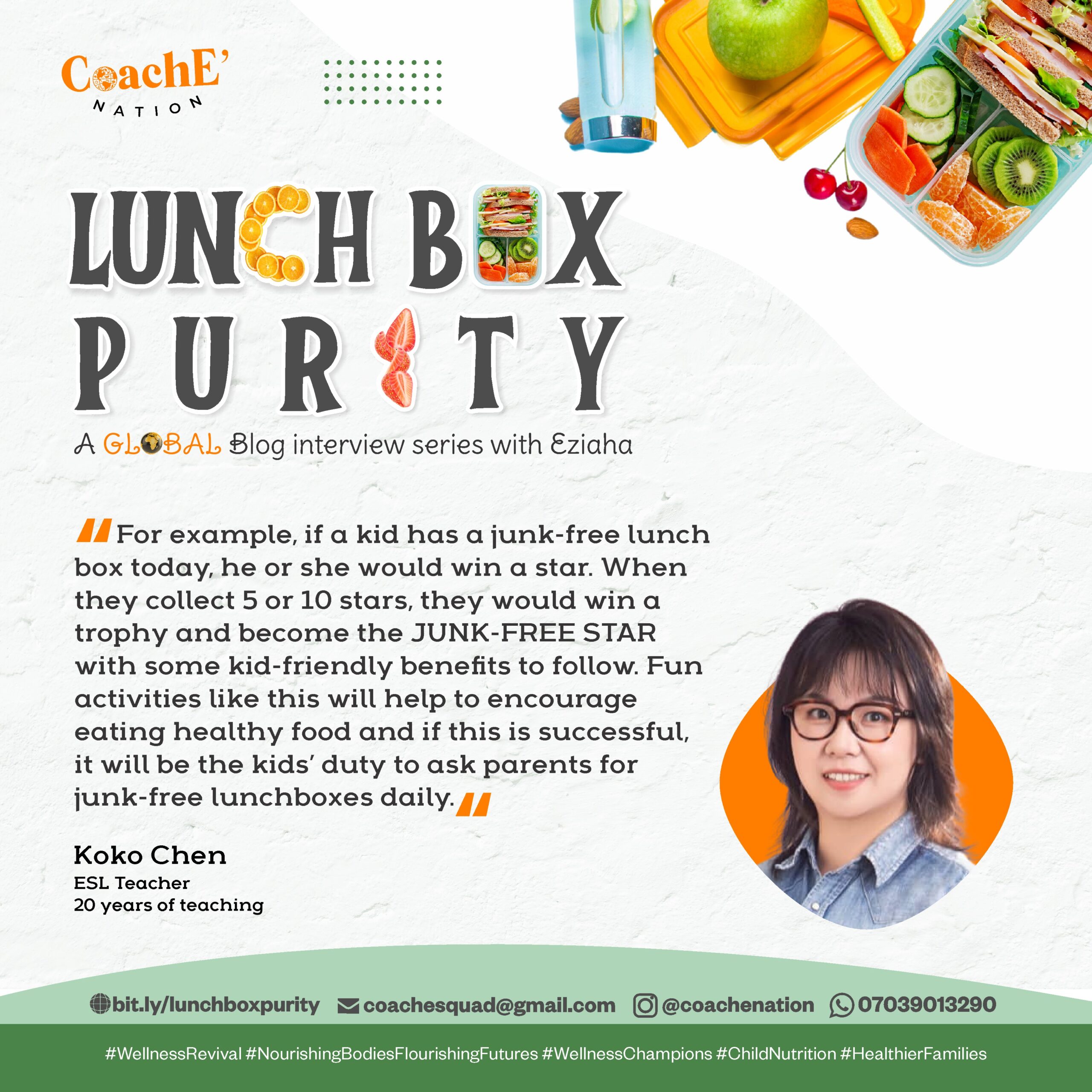
(I absolutely love this. So instead of directly educating the parents here, we can create the kind of environment that motivates the kids into desiring healthy foods and then the kid can educate the parents without direct interference by the Teacher. BRI-to-da- LLIANT!!!!)
6. How can the Government, Federal or state, throw their weight behind schools (in terms of policies for example) in the fight to ensure that at least within schools, child nutrition is front and centre!
I guess fund aid is necessary. When the schools have more money from government spending in food, they would let the society see how hard they are trying to offer junk-free food to children.
7. Are there ways you have successfully incorporated Nutrition education into your curriculum? Can you share any successful strategies you’ve used to make nutrition education engaging for children? This really speaks to it being incorporated into the learning curriculum as opposed to scheduled events.
So far no, there are not. But in my way of teaching, I will put someone who eats healthy food as an example and encourage the whole class to learn from him or her.
8. What Policies/Practices does your school have in place to ensure healthy eating for children while at school? What have you found to work and have you faced any challenges in implementing them? Maybe culinary or nutrition-related events? Please share memorable experiences from these if any?
My last job was in an international kindergarten. The owner purchases food from big food companies, like Sam’s Club and Metro. They ask professional people to set nutritious and healthy weekly menu for different ages. Take buns for example, to encourage kids to eat the buns, the baker designs the shapes of the buns like an artist with very creative designs and shapes like books, carrots, etc. The designs look so real that sometimes we can’t tell if it is the real thing or a bun. It really made eating a fun experience for the kids.
(I like the idea behind big purchases and then bringing in professionals to set the menu. Many schools in Nigeria where meals are served don’t necessarily use professional pediatric Nutritionists for their menu. This was something we discussed last week in the Nourish Flourish Moms club and it does make sense that if we are outsourcing our kids’ meals to the school, you look into what exactly they are feeding them and how they are prepping it. That Maine video we reviewed was so detailed! Phew! The next NF Club starts on the 17th of March and the link with details is here.)
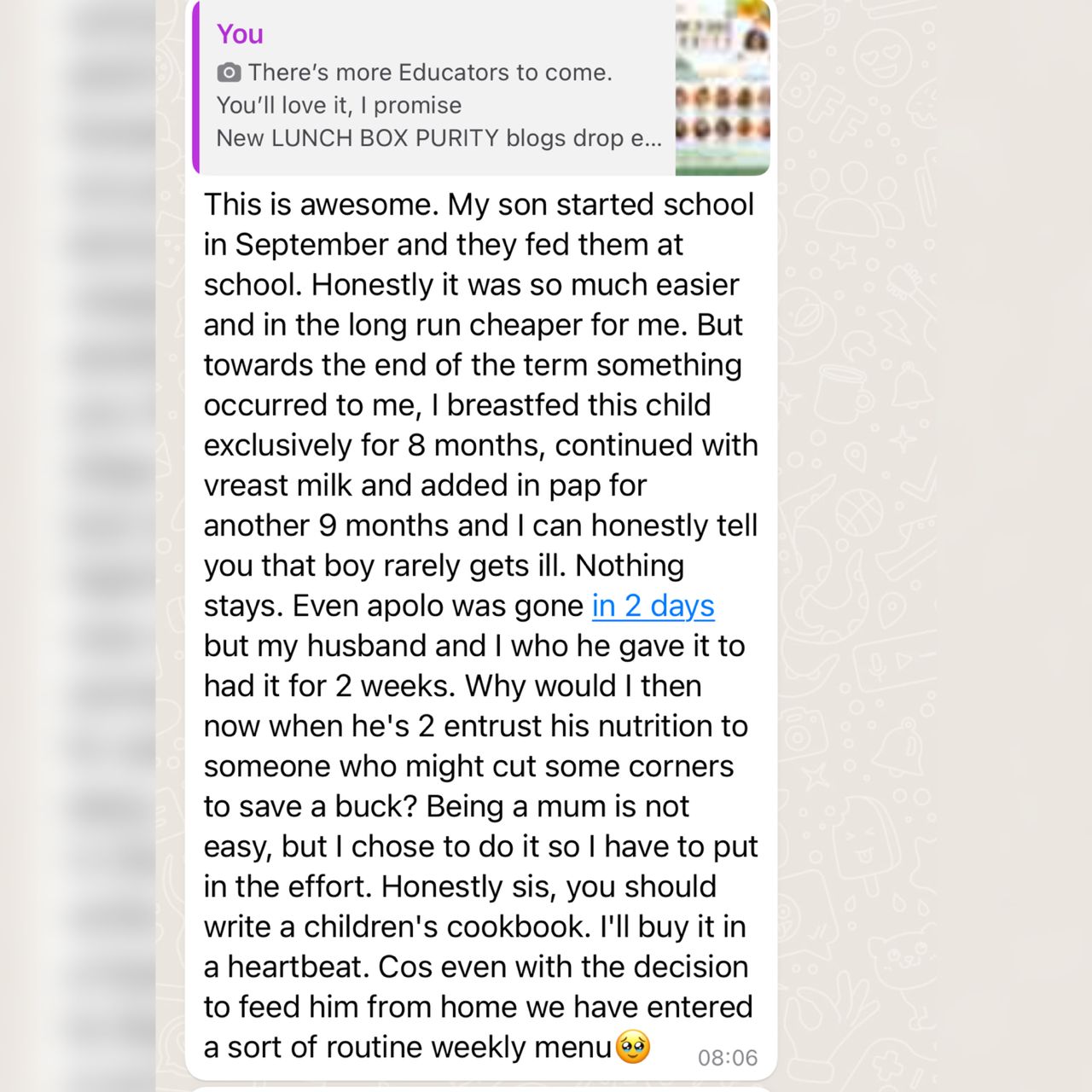
9. Do you have any suggestions for Special Needs Educators to unite and create a forum/melting pot where they can rub minds especially when it comes to diet and lifestyle of kids with special needs so that they can help even more kids, Educators and Parents? Does anything like this exist? If it does, how helpful is it? And if you don’t mind sharing, please do? If not, do you have suggestions for how to optimize?
There is one rule that fits it all – it is love. The more teachers love their students, the stronger the relationship between them becomes and this solves most of the problems. The love could be to accept and to improve their abilities at their pace. It’s more like one-on-one job, which needs much patience and skills. This is not limited to diet and nutrition but every aspect that affects the child’s overall well being. It is necessary that parents and teachers communicate and share ideas together a lot, because kids behave differently when they are with teachers and parents. Teachers could give professional guide to parents as the learn how the kids behave outside of the school environment. Parents also learn from the Teachers how the kids behave at school. With this two-way communication between both teachers and parents, the kids are helped even more efficiently. The communication methods can be phone calls, face to face talk, parents group meeting or lectures given by teachers.
10. If your school has a ‘school lunch policy’ only, what measures do you employ and can you recommend to ensure that kids are getting a balanced diet all week round? If you are privy to that information, why did the school adopt that stance of being the sole-provider of lunches for the kids?
I don’t have an experience of this directly but in my former IELTS training school, we had a special camp that all the twenty students who were from 18 to 30 years old were studying and living together for two weeks. I was the one who decided what to eat for lunch and dinner during the fourteen days. The breakfast menu is set by the camp base which was a buffet that the students choose what they liked. For lunch and dinner, I usually had a ‘meat and vegetables’ balanced menu for them for most of the days and I left two or three days open for simple food like Noodles only, and then one or two meals of Burgers and French Fries. Since most of the time in the camp they were sitting and having class in the classroom, the dishes they had were less oily in case they might get sleepy during the class in the afternoon. At the end of the camp, there was a big feast to celebrate.
(So basically, the goal is balance and moderation. More healthy than otherwise)
11. If your school gives the children lunch in school, whether optional or compulsory, how do you take kids with special dietary conditions into consideration, ensuring that they are also all-round well-nourished?
There are two scenarios that I would like to share. The first one is my girl’s Public school. Their lunch is cooked by the school canteen. They usually offer two dishes with one meat and vegetable and the other vegetable only. Sometimes they prepare soup for the students. Because they are Muslim kids at school, the meat is chicken for most of the time.
Unfortunately, chicken meat in China is not the healthiest and we as parents don’t cook chicken a lot, especially fried ones at home. But at school, for financial reasons, convenience of cooking and taste sometimes, chicken and fried chicken are often seen in their school lunch. So, if I were in charge of this, I would probably change the situation by offering healthier foods and meats.
The other scenario is the international kindergarten, which is much better. They offer three meals and two snacks (cakes or cookies and milk at 10:30 a.m. and fruit at 2:30 p.m.). Monday to Friday. All the ingredients are carefully selected and cooked. In my city where the International Kindergarten is, parents are charged 35yuan (5 US dollars) per day, while my girl’s public school charges 12 yuan (2 US dollars) per meal. I am not saying that the public school is wrong, but I guess parents would love to pay more for better food for their children.
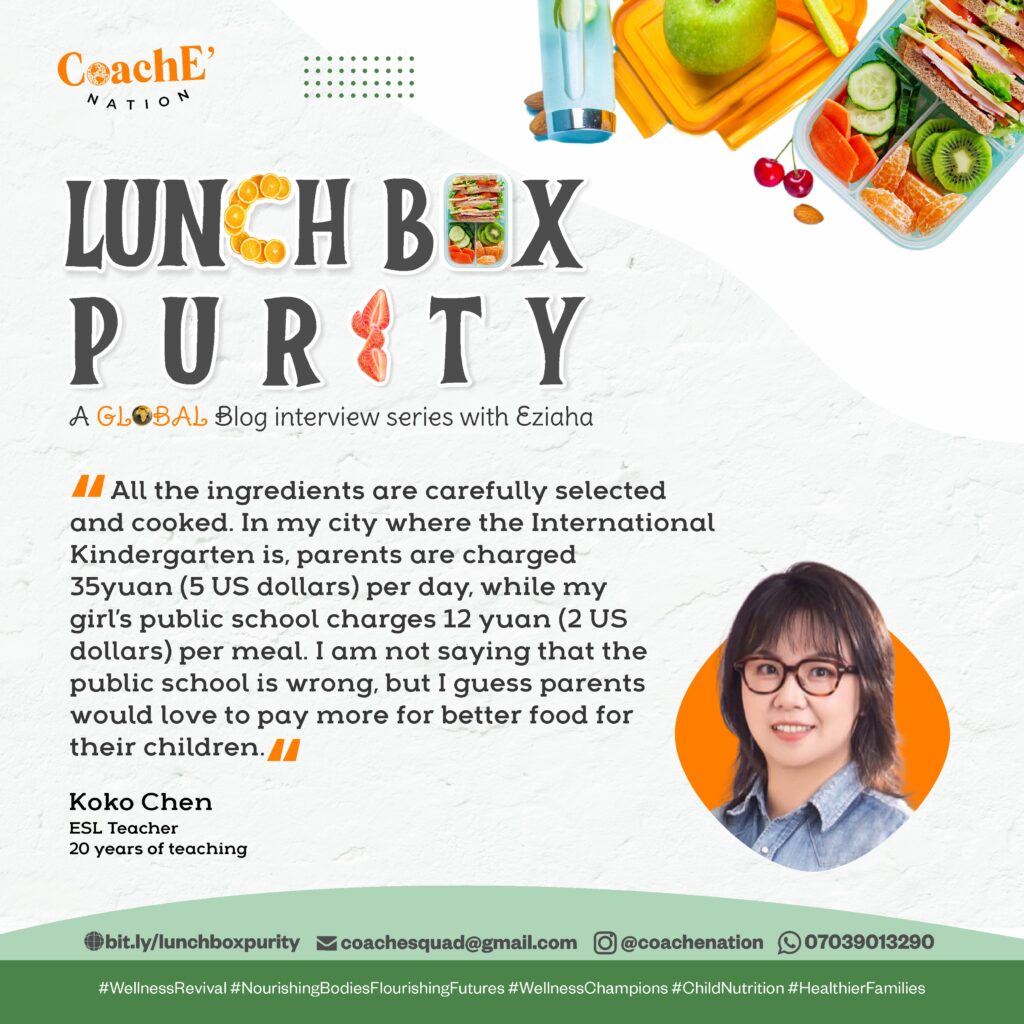
It is not a ‘yes or no’ question whether we should make school lunch optional or compulsory, the real question is ‘Do you want to feed your children healthy or not? And how supportive of and involved in is the Government when it comes to school lunches?’
(I think this is such a powerful question and incidentally, I got this from a Mom who was explaining why she had to withdraw school lunch for her precious son here in Nigeria. We parents really need to start asking and answering this question of convenience very honestly)

Koko’s last words.
I feel lucky to be featured in the blog interview and it did make me think a lot and in ways that I have never thought before even though I have been a mom for 10 years. For our Chinese (and global) parents, as we learn that food is connected to learning and scores, we will work hard and better at it for our cute children. Finally thank you so much. This has been a great experience in all my educational career.
Oh my goodness, this was so so good! I feel so privileged to be championing this and I look forward to reading from you in the comments below as you share your big learnings and wins from this series so far. I am really curious to know what changes you are already making and how this is changing the game for you and your kids. Share with me below and let’s learn together please.
P.S
I hosted a 2-day Wellness Revival in November 2023, where we went deeeeeeep with professionals, Moms and other Influencers talking about Child Nutrition. You can catch access to both days here

Details about the Club can be found HERE so if you need some hand-holding, jump on board the next one. The first one is currently underway and has been hugely impactful for the Moms who joined.

And yes, my book, WELLNESS CHAMPIONS also launches in June 2024, on my birthday so look out for that one!
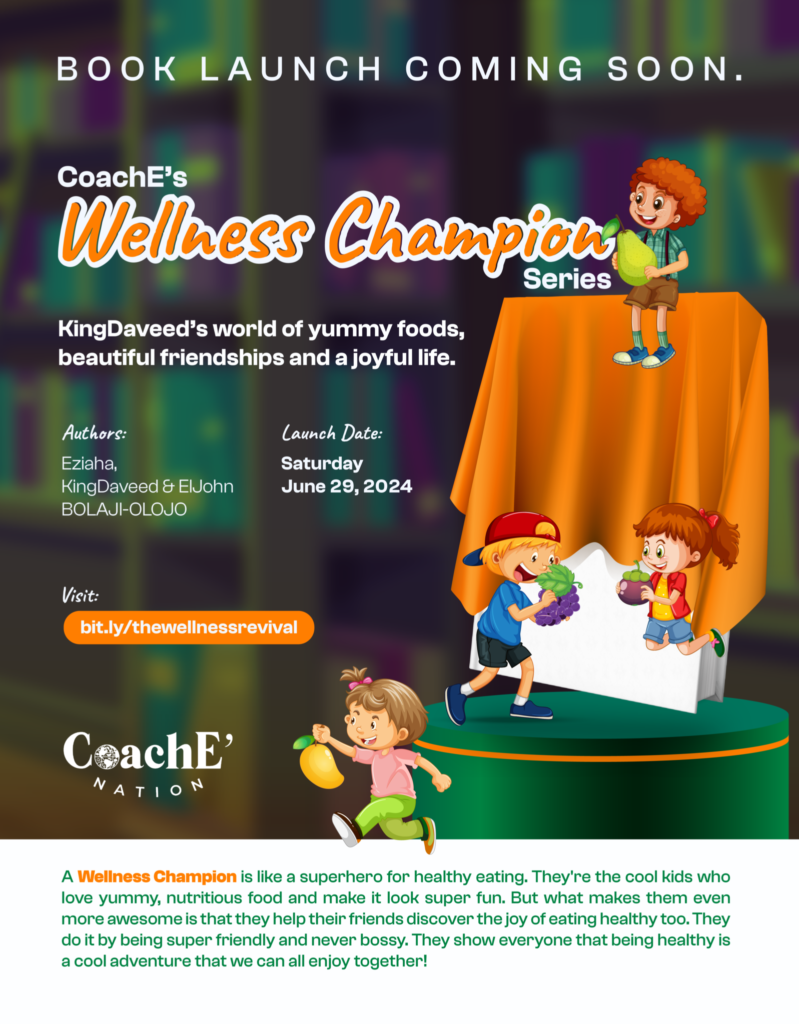
If you’re not yet part of my mailing community, a joyful community of Best Lifers. Join in HERE, there’s room for everyone……..
And also, if you are looking to join any of our coaching programs, either group or private coaching program, check out the flier for details


PPS
Follow me on my brand new IG here after being away for over four years, and on LinkedIn here. My YouTube channels is value-choked and you can join that family here

